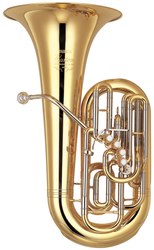Contrabass tuba

A bass tuba in F
|
|
| Brass instrument | |
|---|---|
| Classification | |
| Hornbostel–Sachs classification | 423.232 (Valved aerophone sounded by lip movement) |
| Inventor(s) | Wilhelm Friedrich Wieprecht and Johann Moritz |
| Developed | 1835 |
| Playing range | |
| Related instruments | |
The tuba (UK /ˈtjuːbə/ or US /ˈtuːbə/;Italian pronunciation: [ˈtuːba]) is the largest and lowest-pitched musical instrument in the brass family. Like all brass instruments, sound is produced by moving air past the lips, causing them to vibrate or "buzz" into a large cupped mouthpiece. It first appeared in the mid 19th-century, making it one of the newer instruments in the modern orchestra and concert band. The tuba largely replaced the ophicleide.Tuba is Latin for 'trumpet'.
In America a person who plays the tuba is known as a tubaist or tubist. In the United Kingdom a person who plays the tuba in an orchestra is known simply as a tuba player; in a brass band or military band they are known as a bass player.
Prussian Patent No. 19 was granted to Wilhelm Friedrich Wieprecht and Johann Gottfried Moritz (1777–1840) on September 12, 1835 for a "bass tuba" in F1. The original Wieprecht and Moritz instrument used five valves of the Berlinerpumpen type that were the forerunners of the modern piston valve. The first tenor tuba was invented in 1838 by Carl Wilhelm Moritz (1810–1855), son of Johann Gottfried Moritz.
...
Wikipedia

